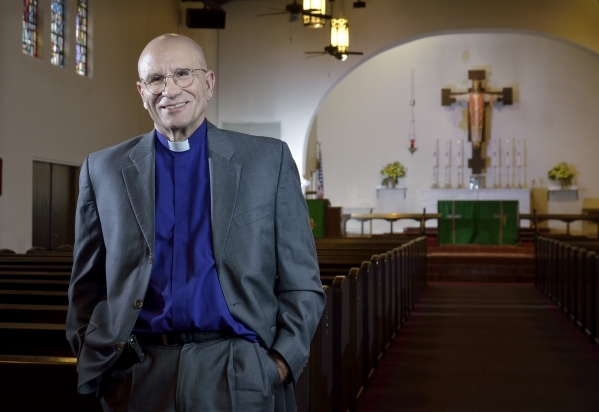Bishop discusses spirit of season, fondest holiday memory
Vegas Voices is a weekly question-and-answer series featuring notable Las Vegans.
Bishop Dan Edwards has, as he once described it, "hopped on several spiritual lily pads" over the course of his life.
Edwards' extensive — and for an Episcopal bishop, pretty unconventional — spiritual resume includes membership in Baptist and Presbyterian churches and periods of agnosticism and Buddhist practice, not to mention a lifelong inclination to wrestle with spirituality's big questions.
Since January 2008, the Texas-born former attorney has served as bishop of the Episcopal Diocese of Nevada. With Christmas on the way, we talked with Edwards about whether the holiday is becoming more secularized, how the observance of Christmas has evolved in his own life and his thoughts about the so-called war on Christmas.
Review-Journal: Every year, billboards appear that talk about putting Christ back in Christmas and how Jesus is the reason for the season. Has Christmas lost ground in a secular society?
Edwards: I think that some people can be a little pious in a sour way that is intolerant of a lot of very natural human pleasure. That goes on at Christmas, and the fact that people give each other gifts and families gather and friends have parties and so forth is all very good. And Christ can be present in those seemingly secular activities, even if his presence is not explicit. So I am not as critical of that normal Christmas behavior these days as some people might be. At the same time, I do think there is something that we miss if we forget that this is the feast of the Incarnation and that there is a profound spiritual truth that Christmas is intended to recognize and honor.
R-J: But you're not buying a "war on Christmas"?
Edwards: Well, no. I mean, I couldn't care less about the Starbucks cup. It doesn't bother me in the least. But what is happening is the desire to recognize there are other holy days from other traditions going on around us at this same time. Hanukkah and Kwanzaa and winter solstice, all of these things are happening, and we want to be respectful of those other traditions. Christians are, I think, far more attractive when we are respectful of our co-religions than when we insist on being the only show in town.
R-J: How has your own observance of Christmas evolved over the years?
Edwards: Before, I really did not know anything about the rhythm of the liturgical year. Since I became an Episcopalian, I have learned to observe Advent as a time of reflection and preparation. It's kind of a sense of waiting. We have two experiences that keep recurring. One is the experience of God's presence, and the other is the experience of God not being nearly as present as we need God to be. So there is a sense of God's absence and a sense of longing, and Advent is a time when we experience that longing.
R-J: What can people do to recover the spirit of the season?
Edwards: There is kind of a dual spirituality that goes on in Christmas itself. There is a part of the spirituality that says you really want to be home for Christmas, you want to gather with those who are nearest and dearest to you, and you look at the Holy Family and you want to be close to each of them as they seem to be close to each other, and that's all perfectly good. But the other side of this is, we have to remember what happens after (Jesus') birth is the Holy Family became refugees. The Holy Family has to flee to Egypt from religious persecution, and that reminds us of the importance of opening our hearts to welcome the others. As long as our thoughts and affections are contained within the small group of those nearest and dearest to us, we are not fully open to Christmas. We're open to Christmas when we are open to the Syrian refugees. We are open to Christmas when we are willing to take a risk in order to extend compassion to people who are suffering.
R-J: What's your own favorite Christmas memory?
Edwards: I think my favorite Christmas memory is one year when the children were asleep and everything had been done to get ready for Christmas. I had come home from midnight Mass in the wee hours of the morning, and I was sitting there, alone in the living room, with the Christmas tree, (with) no other lights on in the house except on the Christmas tree. And just sitting there, contemplating the Christmas tree, because the Christmas tree is a holy object. It represents the Incarnation to us. It represents God's presence in this frail and mortal life. It really was a profound moment.
— Read more from John Przybys at at reviewjournal.com. Contact him at jprzybys@reviewjournal.com and follow @JJPrzybys on Twitter.

















